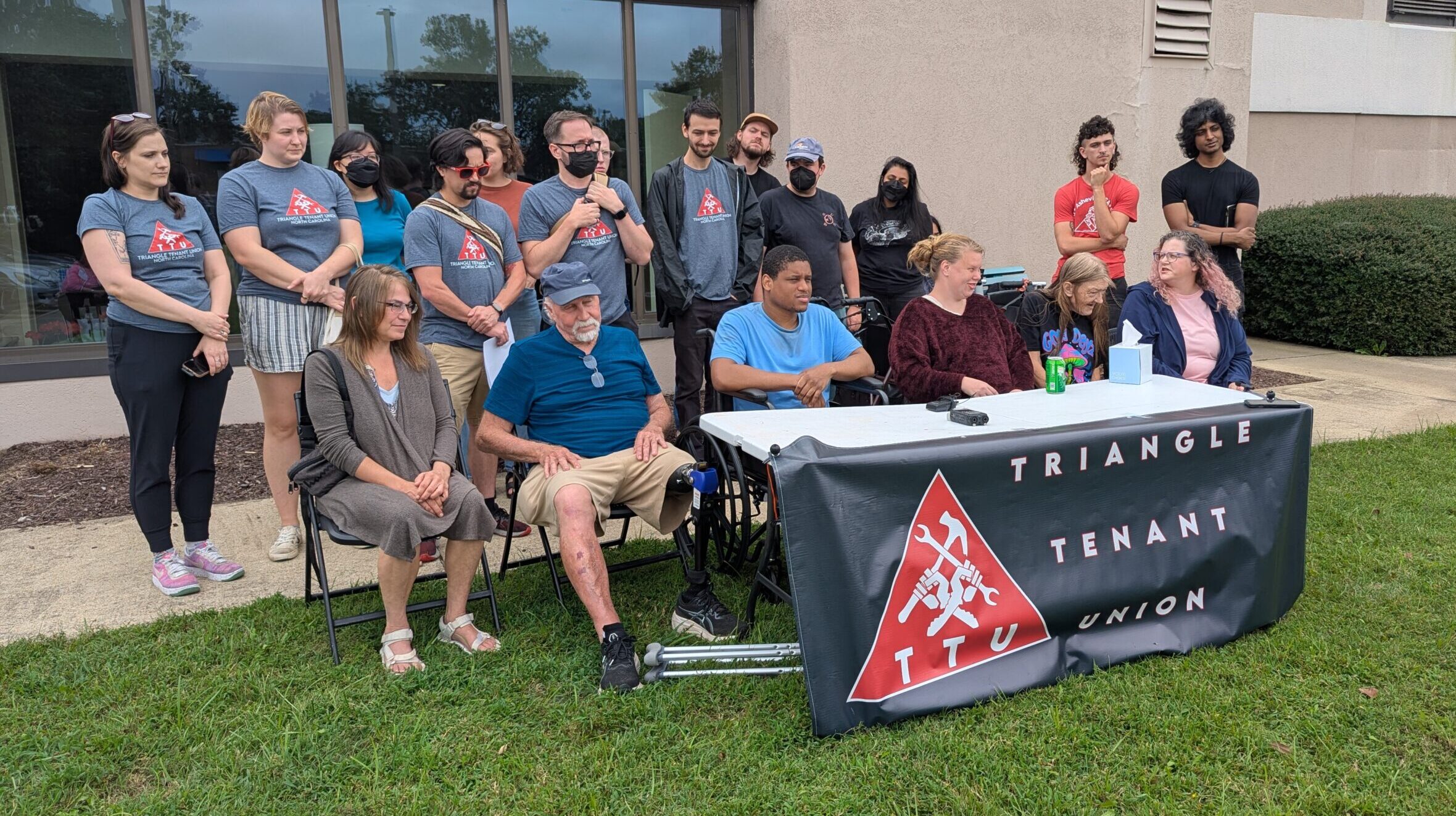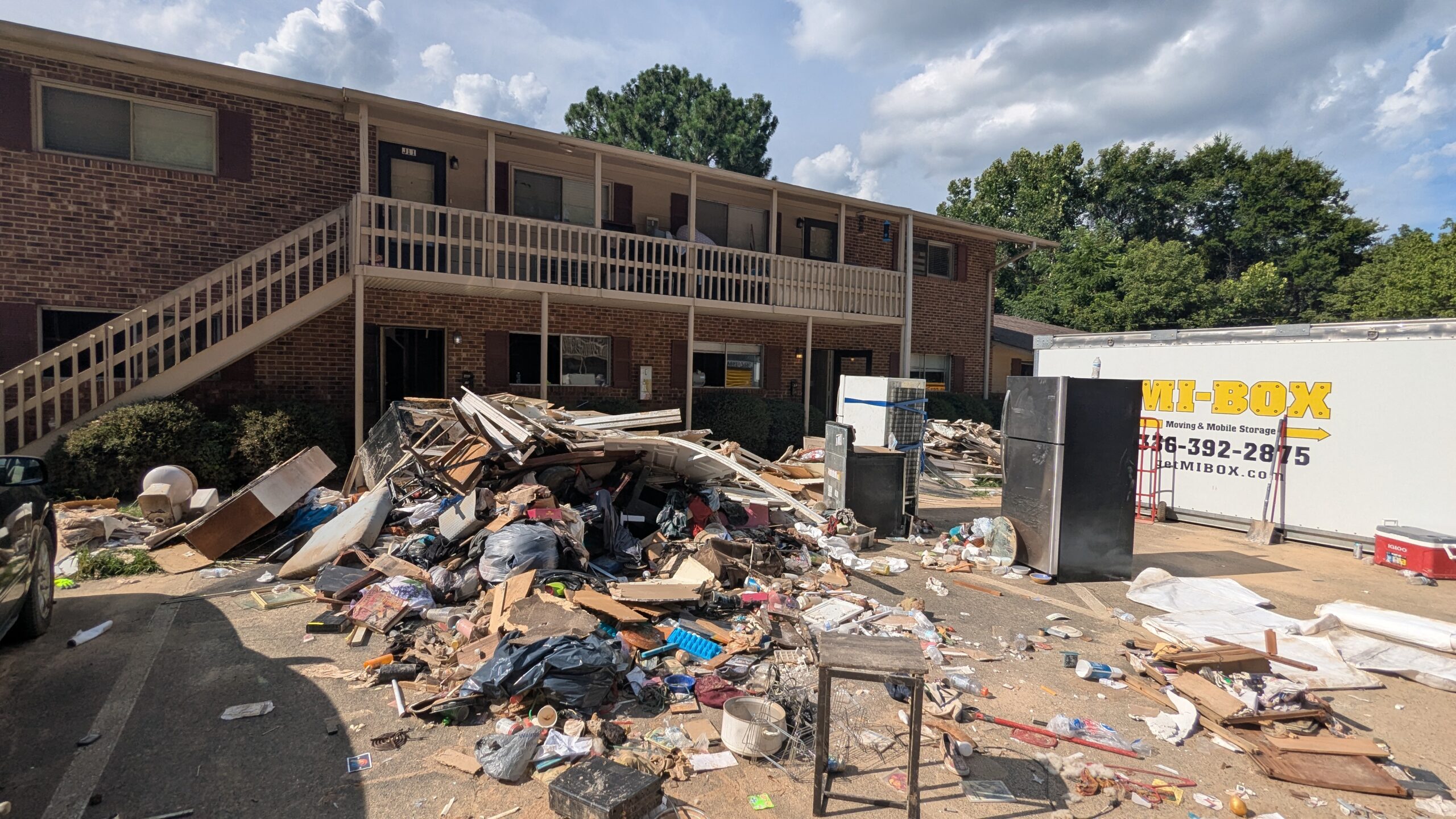Twenty-five residents of Camelot Village in Chapel Hill are staying in nearby hotels being paid for by the local governments following displacement from flood damage sustained during Tropical Depression Chantal. But the group is facing a looming deadline for when the initial funding runs out. And not only are the flood victims struggling to figure out where to go after the hotel, but some report slow responses from their landlords and hurdles to being repaid for their unlivable rental units.
Before Chantal’s floods wrecked his apartment, Dale Weldele rented at Camelot Village for more than two years. He said he enjoyed the neighborhood and proximity to amenities like Chapel Hill’s Community Center Park and nearby businesses. But Weldele, who wears a prosthetic on his left leg, said he could have died in his home if neighbors had not helped him the night of July 6.
“My prosthetic came off in the current, I couldn’t stand against the water,” he said of his attempt to leave the building. “So, I’m on one leg with crutches trying to make it to the stairs through the whole thing…by the grace of God, I made it there. [But I] lost everything. There was four feet of water in the apartment, everything got destroyed.”
The community was the site of many water rescues and evacuations the night of the storm, which saw historic levels of rainfall from a tropical depression forecasted to only bring 1-3 inches of rain. The naturally-occurring affordable housing community is a rarity in Chapel Hill with its lower-income offerings — but that is in part because of its proximity to Bolin Creek and tendency to flood. In the wake of Chantal, many residents with impacted units are looking elsewhere and are finding limited options for their budgets amid a broad housing crunch within the greater Chapel Hill community.
After staying at Orange County’s Emergency Shelter and then moving to the Comfort Inn off 15-501 in Durham, Weldele called his landlord who refunded him rent and his deposit.
“Mine was a great person, she gave it back right away,” he said. “[She] cared about me and said, ‘Please stay in touch, it was wonderful knowing you.’”
Other displaced flood victims from Camelot Village are having a more difficult time. A group, including Weldele, shared their experiences during a press availability held outside the Comfort Inn on Wednesday organized by the Triangle Tenant Union. The community’s individual units are owned and either rented out or kept by the homeowners, so not every renter has the same relationship or communication with their landlords. And many of the other residents who spoke at the hotel said they have not gotten their July rents or security deposits repaid.

Seated, from left to right: Camilla Hackney, Dale Weldele, Quinten Simmons, Jessica Tickles, Joyce Lester and Heather Gibbs share their perspectives as displaced Camelot Village residents. Members and supporters of the Triangle Tenant Union stand behind them at the Comfort Inn in Durham on Wednesday, Aug. 20. (Photo by Brighton McConnell/Chapel Hill Media Group.)
Heather Gibbs, who moved into Camelot Village in April, said she was unaware of the flood risk until she was signing her lease – and even though she had apprehensions, she feared risking her county housing assistance by prematurely ending the leasing process. After her experience with Chantal, she said she will “never return.” But Gibbs added that she has not gotten her July rent back from her landlord, Richard Kunst, and is financially strained amid her search for a new place to live. She said the Red Cross relief money she received was “instantaneously” used up by application fees and buying essential items for living at the hotel.
“I’ve spent over $300 in application fees,” Gibbs said. “If I had my rent returned, that would help with some of that…and just getting basic necessity items.”
Jessica Tickles is a tenant of a Louise Beck Properties-owned unit at Camelot Village, where she’s lived for seven months. She described the floodwaters coming up to her shoulders on July 6 and losing everything, including her vehicle. She’s had no success getting her security deposit back yet and is feeling desperate to find a solution when the local government aid for staying in the hotel ends.
“I’m going to be homeless, pretty much,” said Tickles. “Because I haven’t found [any] place to go that I can afford. I had to take off work to find housing…so I’m restarting back to work, and I’m starting from zero again.”
The Town of Chapel Hill provided $100,000 to Orange County from its Affordable Housing Funding Program to cover the costs for displaced residents, which the county is administering to the hotels. But that money is nearly used up, and the flood victims at Comfort Inn learned they will have to leave after Aug. 28. Orange County’s social services, housing and emergency services departments are committed to following the group and providing updates Deputy Manager Caitlin Fenhagen said in an email on Aug. 15.
Like how Camelot Village residents and neighbors relied on each other to escape Chantal’s flooding, a coalition of community organizations are helping aid the displaced residents now. Triangle Mutual Aid and faith communities are providing daily meals for those staying at Comfort Inn, and the Triangle Tenant Union is advocating for their financial needs.

Nearly two weeks after Bolin Creek’s floodwaters ripped through Camelot Village, debris and waterlogged belongings were strewn throughout the Chapel Hill neighborhood on July 18. While the area has been cleaned up, many of the flood-impacted units are far from acceptable remediation and dozens of residents seek housing elsewhere. (Photo by Brighton McConnell/Chapel Hill Media Group.)
C.R. Clark, an organizer with the renters-run union, said Wednesday he wants the local governments to increase their relief efforts for the Camelot Village flood victims and others still seeking new housing. But he stressed the landlords who have not given back rent or deposits are breaking North Carolina law by not providing habitable living conditions. Triangle Tenant Union is helping flood victims with their requests and calls, but the impacted renters cannot afford to take matters to court.
“They don’t have time for that,” Clark said. “They have a one-week deadline before they have to get out of [this hotel], and it’s just like the county is saying, ‘Well, just figure it out.’ And a lot these people have been through so much trauma that ‘figuring it out’ part is really hard, especially when you don’t have access to their resources.
“That rent and those deposits is their money,” he added, “that’s not being returned so they can move forward with their lives, get housing, return to their dignity.”
Quentin Simmons, who is a wheelchair user, was the longest-tenured Camelot Village resident of the group who spoke, having lived there consistently since 2018. He said his landlord is offering the security deposit back, but he cannot quickly get it because he doesn’t have any safe forwarding address where they can send it.
One thing Simmons made clear: out of fear of the next big flood, he does not plan to move back to Camelot Village – which he called “a death trap.”
“I don’t know if anybody died in the flood, but someone is going to end up dying in that place,” he said. “So, if you really want to fix the problem, you really have to fix the draining or figure something out – because this is going to keep happening, this has happened at least a dozen times.”
Chapelboro.com does not charge subscription fees, and you can directly support our efforts in local journalism here. Want more of what you see on Chapelboro? Let us bring free local news and community information to you by signing up for our newsletter.










